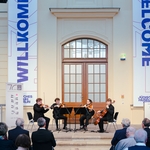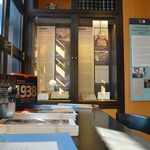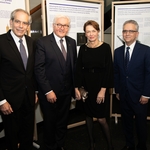Leo Baeck Medal for Eric R. Kandel



- Datum
- Mi., 18. Nov. 2015
It was with “great honor, great privilege, and heartfelt emotion” that Ronald B. Sobel awarded the Leo Baeck Medal on November 17, 2015 to Eric R. Kandel. The laureate, as the president of the Leo Baeck Institute emphasized, was, “with all of his other gifts, a magnificent mensch”.
Kandel is a neuroscientist at Columbia University whose work on the molecular biology of memory opened new methods of inquiry into the study of the brain and mind. In 2000, he won the Nobel Prize in Physiology or Medicine for demonstrating how memories are formed and stored at the molecular level.
In addition to his ground-breaking work as a brain scientist, Kandel is a keen observer of the history of ideas who has consistently placed his work on the mind in the context of a larger cultural history. His 2012 book The Age of Insight locates the roots of his own quest to understand the mind in the cultural ferment of early-20th-century Vienna—the city of his birth—where artists and scientists began a revolution that expanded our conception of the mind to include both conscious and unconscious thoughts and emotions.
After accepting the medal, Kandel shared insights from his life and research in a conversation with the journalist Ethan Bronner of Bloomberg News.
Dr. Eric Kandel on…
…the pogroms in Vienna, trauma, and optimism:
I’m delusionally optimistic. That’s a defense mechanism. I was really quite seriously traumatized. And I do think back on those moments. It affected every aspect of my life. I married Denise, who had a much more difficult experience than I. She was a hidden child in a convent for two years. And no one except the mother superior or perhaps one other person knew that she was Jewish. Why did Denise and I bond? Why have we had such a wonderful marriage for 60 years? We both underwent very similar traumatic experiences.
…life in the lab:
I had just read textbooks about science, and they are unbelievably boring. In the lab it’s so different. You think about ideas, you gossip. You work with your own hands—the sensual pleasure of working with your own hands. And, once in a while, you have a crappy idea of your own. […] Most people don’t realize how enjoyable it is and how the group activity is pleasant. We have a room in the center of our lab. You can go there every hour of the day and night, and there is somebody having a sandwich, gossiping with somebody else, or talking science there. It’s really a way of life.
…his first scientific breakthrough:
So, if you scare the hell out of the animal by shocking its tail, instead of withdrawing slowly, it would withdraw abruptly. And it would continue to withdraw like this, depending on the number of training trials. I worked out the neural circuit of this behavior, and I could see that there was a change in the strength of connections between nerve cells. How one nerve cell talked to another—this was altered. No one knew how learning occurred. This was the first evidence that showed that learning involves strengthening how nerve cells talk with each other.
…money, marriage, and working in academia:
So when I was working in Grundfest’s lab, and I realized for the first time I really like this stuff, I was dating Denise. We sort of decided we were getting married, and we met for dinner. I said: ‘You know, I really like this! I could be doing this for the rest of my life, but it’s absurd: You and I are going to be married, and we want to have children, but you don’t have any money, I don’t have any money. You know, I have to go into private practice.’ She said: ‘Absurd! Money is of no significance.’ I should tell you, she has not repeated that often since.
…the German and Austrian-Hungarian Jewish traditions:
I looked at the list of former winners of the Leo Baeck Medal, and this is indeed a German-Jewish tradition. A lot of Jews lived in Austria-Hungary, yet very few of them have been recognized by this distinguished award. Why is this so? It actually is quite interesting, because the German-Jewish tradition and the Austrian-Hungarian-Czechoslovakian tradition are different. You see this in Leo Baeck’s writing—very rational, very thoughtful. The Austrian tradition, very much influenced by Galicia and by the Polish, has a Chassidic strain, a mystical strain in it. And it deals with irrational elements. If you look at some of the great minds that have come out of that tradition—you know, Freud, Schnitzler, Kafka—it is unlikely they would have come out of Berlin. When you think of the Jewish tradition, well, Baeck makes this point—there is no single philosopher. There is no single great mind. It’s brought together form many different, almost contradictory traditions.
…Klimt, eroticism, and the hypothalamus:
Klimt knew a lot about sexuality. When you look at his drawings […], they’re marvelous. He depicts women masturbating, sleeping with other women, in the most delicate, thoughtful, and non-pornographic ways—just fantastic. […] [referring to Klimt’s image of Judith and Holofernes] How do you fuse aggression and sexuality like that? We now know the hypothalamus has a region that is concerned with eroticism. It has a region concerned with aggression. And there is a twenty percent overlap. Some cells can participate in one or the other. If these cells are excited weakly, they are recruited for eroticism; if they are excited strongly, in aggression.
…the moment when his wife showed up in his lab with their infant boy in her arms:
I’m shmegegge, and I learned an enormous amount from Denise at every point in the game. There’s just no question about that. I was working extremely hard when Paul was born, and I was extremely moved and thrilled by Paul’s presence. […] But I was so busy with my own research that I didn’t pay as much attention to him as I should have. Denise brought me to reality and made me a slightly better human being than I would have been otherwise.
Aktuelles





